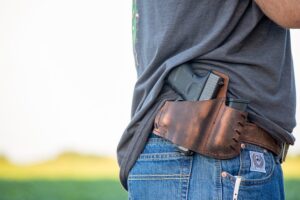In West Virginia (WV) and elsewhere, gun rights and regulations have sparked significant and sometimes contentious debate. While residents of the Mountain State are no longer required to obtain a West Virginia concealed carry permit, there are several considerations to keep in mind.
Understanding West Virginia’s concealed carry laws and reciprocity with other states can help you avoid legal troubles when traveling across state lines with a firearm. A knowledgeable WV gun rights lawyer can also help you navigate legal issues related to firearms, licenses, and travel.
West Virginia Concealed Carry Permit Laws

West Virginia law allows residents who are at least 21 years old or 18 years old and honorably discharged from the military to carry a concealed firearm without a permit. However, individuals must still abide by certain restrictions and regulations. For example, carrying concealed weapons in government buildings, schools, and certain designated areas may be prohibited in WV and elsewhere.
Even though it is no longer required, obtaining a West Virginia concealed carry permit can have advantages. Having a valid permit may allow a gun owner to benefit from reciprocity agreements with other states, granting the ability to carry concealed firearms when traveling outside of West Virginia in some cases.
WV Concealed Carry Reciprocity: Can I Carry a Gun Across State Lines?
If you travel across state lines and wish to carry a concealed gun, understanding reciprocity agreements is crucial. Reciprocity refers to the mutual recognition of concealed carry permits between different states. It allows permit holders to legally carry concealed firearms in states that have established reciprocity with their home state.
West Virginia has been granted reciprocity with several states, including neighboring states like Kentucky, Virginia, Ohio, and Pennsylvania. These agreements allow residents to legally carry concealed firearms in these states when they meet the respective state’s requirements. It’s important to note that reciprocity agreements can vary and are subject to change, so you should consult official sources like the WV Office of the Attorney General or discuss your situation with a WV gun rights lawyer to ensure you stay up to date with the latest information.
Seeking Guidance from a WV Gun Rights Lawyer
Navigating the map of concealed carry laws, especially when traveling across state lines, can be challenging. Consulting a lawyer can help you understand your rights and responsibilities. An attorney is also critical when dealing with any legal issues that arise from carrying a concealed weapon.
A WV gun rights lawyer understands firearms laws and can provide guidance on WV concealed carry reciprocity and whether it may be beneficial for you to obtain a permit.
Understanding the Benefits of a West Virginia Concealed Carry Permit
While West Virginia doesn’t require a concealed carry permit, residents should consider the advantages of obtaining one. By acquiring a concealed handgun license in WV, you can enjoy the benefits of reciprocity when traveling across state lines, allowing you to legally carry a concealed firearm in states that have established agreements with West Virginia.
Consulting with a WV gun rights lawyer can provide you with the necessary guidance to navigate the intricacies of the law, ensuring that you stay informed and make responsible decisions regarding carrying firearms. Remember, staying informed and abiding by the law are essential for promoting both personal safety and the well-being of the community. Contact attorney Jason Harwood at Harwood Legal, PLLC in Logan to discuss the details of your situation and get guidance on whether you should consider obtaining a West Virginia concealed carry permit or related legal issues. You can reach Jason by calling (304) 752-5015 or completing this online contact form.
